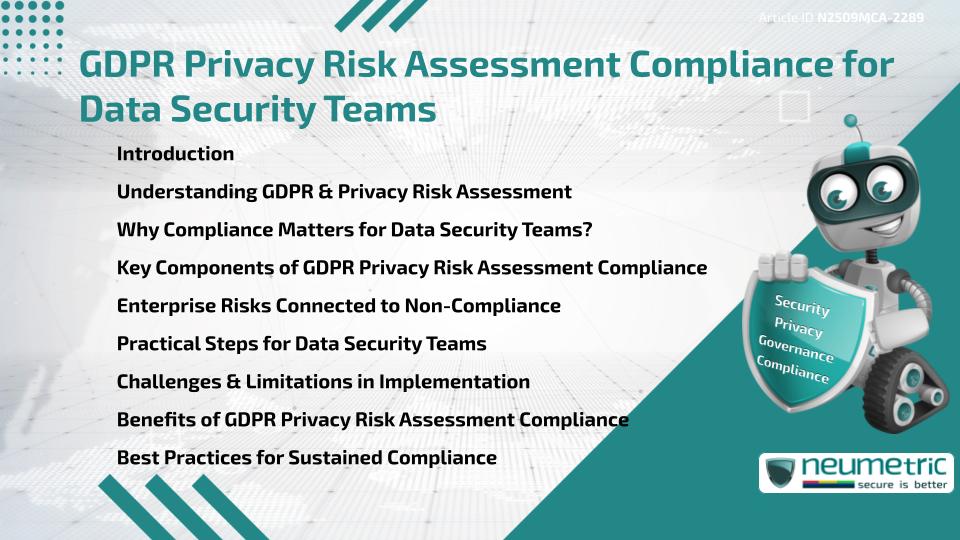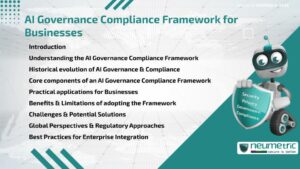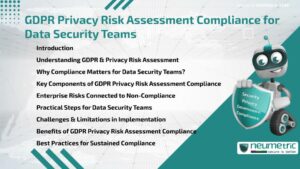Table of Contents
ToggleIntroduction
GDPR Privacy Risk Assessment compliance is a vital process for Organisations handling Personal Data under the European Union’s General Data Protection Regulation [GDPR]. It ensures that Data Security teams can identify, evaluate & manage Risks associated with Personal Data processing. This compliance Framework strengthens enterprise resilience, reduces exposure to fines & builds trust with Customers. By embedding Risk Assessments into Data Protection workflows, Organisations achieve accountability & demonstrate their commitment to safeguarding Personal Data.
Understanding GDPR & Privacy Risk Assessment
GDPR mandates that Organisations perform Data Protection Impact Assessments [DPIAs] when processing is likely to result in high Risk to individuals’ rights & freedoms. Privacy Risk Assessment involves analyzing how data is collected, stored, used & shared to identify Vulnerabilities.
This process helps Organisations uncover hidden Risks, such as excessive data collection or inadequate technical safeguards. For further insights, see resources from the European Commission & European Data Protection Board.
Why Compliance Matters for Data Security Teams?
For Data Security teams, GDPR Privacy Risk Assessment compliance is more than a legal requirement. It provides:
- A structured method to assess & mitigate Data Security Risks
- Clarity on how to prioritise technical controls
- Documentation that demonstrates accountability to regulators
Without these assessments, teams operate blindly, unable to align Security Controls with the specific Risks posed by Personal Data processing.
Key Components of GDPR Privacy Risk Assessment Compliance
Compliance includes several critical components:
- Data inventory – Mapping data flows across systems & third parties.
- Risk evaluation – Identifying Potential Threats & impacts on data subjects.
- Mitigation measures – Applying safeguards like encryption, access restrictions & anonymization.
- Documentation – Recording assessments for Audit & regulatory purposes.
- Stakeholder involvement – Consulting Data Protection Officers [DPOs], legal teams & business units.
These components ensure assessments are thorough & aligned with regulatory expectations.
Enterprise Risks Connected to Non-Compliance
Failure to maintain GDPR Privacy Risk Assessment compliance exposes enterprises to significant Risks. These include fines up to four percent (4%) of annual global turnover, reputational damage & loss of Customer Trust.
Non-compliance also weakens operational resilience. For instance, unassessed Risks may lead to breaches, causing downtime & costly recovery efforts. Risk Assessments act as a preventative shield, much like routine health checks prevent serious illness.
Practical Steps for Data Security Teams
Data Security teams can adopt structured steps for compliance:
- Conduct data mapping – Discover where & how Personal Data is processed.
- Perform DPIAs – Apply GDPR’s requirements for high-Risk processing.
- Engage Stakeholders – Involve DPOs & business leaders in reviews.
- Apply technical measures – Implement encryption, monitoring & Access Controls.
- Review regularly – Update assessments as processing activities evolve.
Challenges & Limitations in Implementation
Organisations face hurdles such as limited resources, fragmented data systems & lack of awareness among staff. Complex supply chains can make it difficult to assess Risks across Third Party processors.
Another limitation is balancing thoroughness with agility. Overly complex assessments may slow projects, while rushed reviews Risk overlooking critical Vulnerabilities. Data Security teams must find a balance that supports compliance & business goals.
Benefits of GDPR Privacy Risk Assessment Compliance
Effective compliance delivers:
- Reduced Likelihood of breaches & regulatory fines
- Greater Transparency & Accountability
- Improved collaboration across technical & legal teams
- Enhanced Customer confidence in data handling
Just as safety checks improve trust in airlines, Privacy Risk Assessments boost confidence in an enterprise’s data practices.
Best Practices for Sustained Compliance
To ensure ongoing GDPR Privacy Risk Assessment compliance, enterprises should:
- Establish a culture of Privacy by design
- Train staff on GDPR obligations & Risk awareness
- Automate data discovery & monitoring where possible
- Review assessments during major system or policy changes
- Keep clear, accessible documentation for audits
Conclusion
GDPR Privacy Risk Assessment compliance is essential for protecting Personal Data, ensuring regulatory accountability & reducing enterprise Risks. By embedding these assessments into everyday processes, Data Security teams strengthen resilience & maintain trust.
Takeaways
- GDPR requires Privacy Risk Assessments for high-Risk processing activities.
- Data Security teams play a central role in implementing these assessments.
- Compliance reduces financial, reputational & operational Risks.
- Practical steps include mapping data, performing DPIAs & applying safeguards.
- Sustained compliance requires training, automation & continuous reviews.
FAQ
What is GDPR Privacy Risk Assessment compliance?
It is the process of conducting Risk Assessments to identify & mitigate Threats to Personal Data processing in line with GDPR requirements.
Why are Risk Assessments important under GDPR?
They help Organisations identify high-Risk processing activities & implement safeguards to protect individuals’ rights & freedoms.
Who is responsible for carrying out GDPR Risk Assessments?
Data Security teams, often in collaboration with a Data Protection Officer [DPO] and business Stakeholders, are responsible.
What is a DPIA in GDPR?
A Data Protection Impact Assessment [DPIA] is a formal process for assessing the Risks of high-Risk processing activities under GDPR.
What happens if an organisation fails to comply?
Non-compliance can lead to heavy fines, reputational harm & operational disruption.
How often should Risk Assessments be performed?
They should be carried out when initiating new high-Risk processing & reviewed regularly as activities evolve.
Can automation help with compliance?
Yes. Automated tools for data mapping, monitoring & reporting improve accuracy & reduce manual workloads.
Need help for Security, Privacy, Governance & VAPT?
Neumetric provides organisations the necessary help to achieve their Cybersecurity, Compliance, Governance, Privacy, Certifications & Pentesting needs.
Organisations & Businesses, specifically those which provide SaaS & AI Solutions in the Fintech, BFSI & other regulated sectors, usually need a Cybersecurity Partner for meeting & maintaining the ongoing Security & Privacy needs & requirements of their Enterprise Clients & Privacy conscious Customers.
SOC 2, ISO 27001, ISO 42001, NIST, HIPAA, HECVAT, EU GDPR are some of the Frameworks that are served by Fusion – a SaaS, multimodular, multitenant, centralised, automated, Cybersecurity & Compliance Management system.
Neumetric also provides Expert Services for technical security which covers VAPT for Web Applications, APIs, iOS & Android Mobile Apps, Security Testing for AWS & other Cloud Environments & Cloud Infrastructure & other similar scopes.
Reach out to us by Email or filling out the Contact Form…





